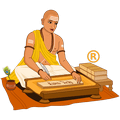























Sunrise07:04 AM
Sunset07:18 PM
Moonrise06:45 AM, Mar 27
Moonset06:36 PM
Shaka Samvat1691 Virodhi
Vikram Samvat1826 Vikari
Gujarati Samvat1826 Plava
Amanta MonthPhalguna
Purnimanta MonthChaitra
WeekdaySomawara
PakshaKrishna Paksha
TithiChaturdashi upto 12:19 PM
NakshatraPurva Bhadrapada upto 12:56 PM
YogaShukla upto 03:42 PM
KaranaShakuni upto 12:19 PM
KaranaChatushpada upto 11:59 PM
Pravishte/Gate16
Rahu Kalam08:35 AM to 10:07 AM
Gulikai Kalam02:43 PM to 04:14 PM
Yamaganda11:39 AM to 01:11 PM
Abhijit12:46 PM to 01:35 PM
Dur Muhurtam01:35 PM to 02:24 PM
Dur Muhurtam04:02 PM to 04:51 PM
Varjyam10:29 PM to 12:04 AM, Mar 27
Notes: All timings are represented in 12-hour notation in local time of Bhavnagar, India with DST adjustment (if applicable).
Hours which are past midnight are suffixed with next day date. In Panchang day starts and ends with sunrise.


 Meena 29:04+
Meena 29:04+ Revati 29:04+
Revati 29:04+

 Mesha
Mesha Ashwini 28:41+
Ashwini 28:41+

 Mesha
Mesha Bharani 28:03+
Bharani 28:03+

 Mesha 09:51
Mesha 09:51 Krittika 27:11+
Krittika 27:11+

 Vrishabha
Vrishabha Rohini 26:06+
Rohini 26:06+

 Vrishabha 13:28
Vrishabha 13:28 Mrigashira 24:48+
Mrigashira 24:48+

 Mithuna
Mithuna Ardra 23:18
Ardra 23:18

 Simha
Simha Magha 16:40
Magha 16:40

 Simha 21:08
Simha 21:08 P Phalguni 15:23
P Phalguni 15:23

 Tula
Tula Swati 15:41
Swati 15:41

 Vrishchika
Vrishchika Anuradha 19:54
Anuradha 19:54

 Dhanu
Dhanu P Ashadha 28:54+
P Ashadha 28:54+

 Dhanu 11:37
Dhanu 11:37 U Ashadha
U Ashadha

 Makara
Makara U Ashadha 07:38
U Ashadha 07:38

 Kumbha 30:53+
Kumbha 30:53+ Shatabhisha 12:32
Shatabhisha 12:32

 Meena 12:13
Meena 12:13 Revati 12:13
Revati 12:13

 Mesha 15:51
Mesha 15:51 Bharani 10:10
Bharani 10:10In Hindu Calendar, the day starts with local sunrise and ends with next day local sunrise. As sunrise time is different for all cities, Hindu Calendar made for one city is not valid for any other city. Hence it is important to use location based Hindu Calendar, like this website. Further, each Hindu day consists of five elements, which are called angas. These five elements are -
In Hindu Calendar, all five elements together are called Panchang. (In Sanskrit: Panchang = Pancha (five) + Ang (part)). Hence Hindu Calendar which shows all five elements for each day is called Panchang. In South India Panchang is known as Panchangam.
When Hindu Calendar includes Muslims, Sikh, Christian, Buddhist and Jain festivals, including national holidays, it is called as Indian Calendar.